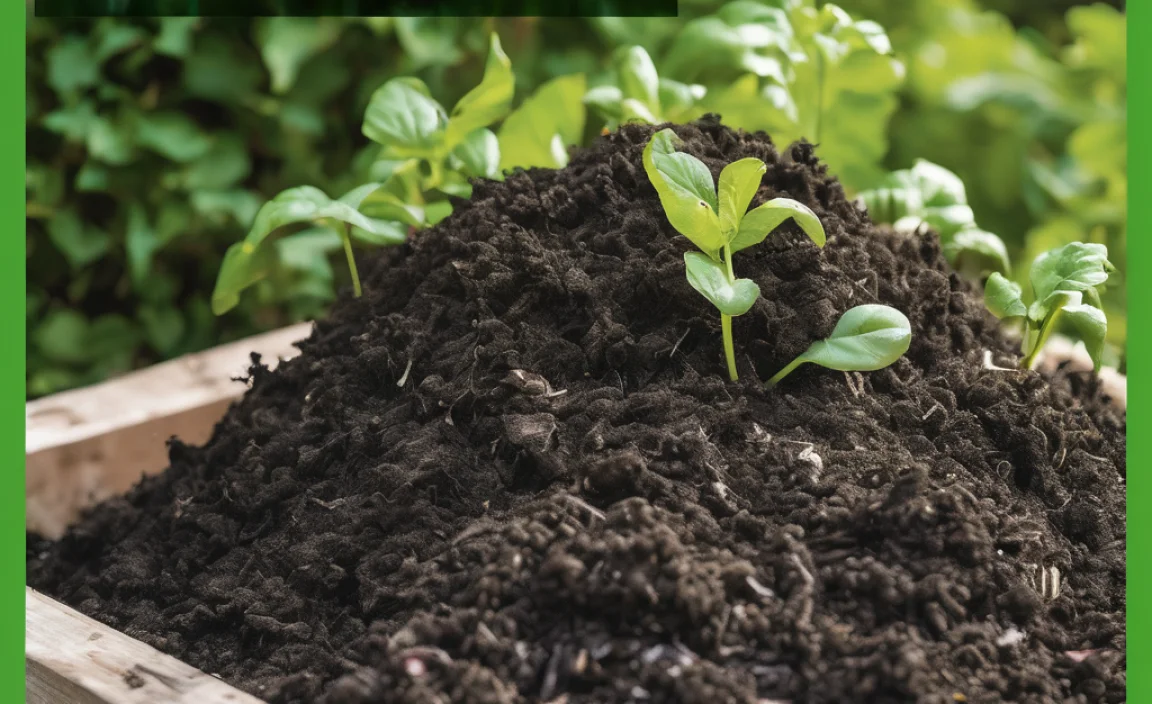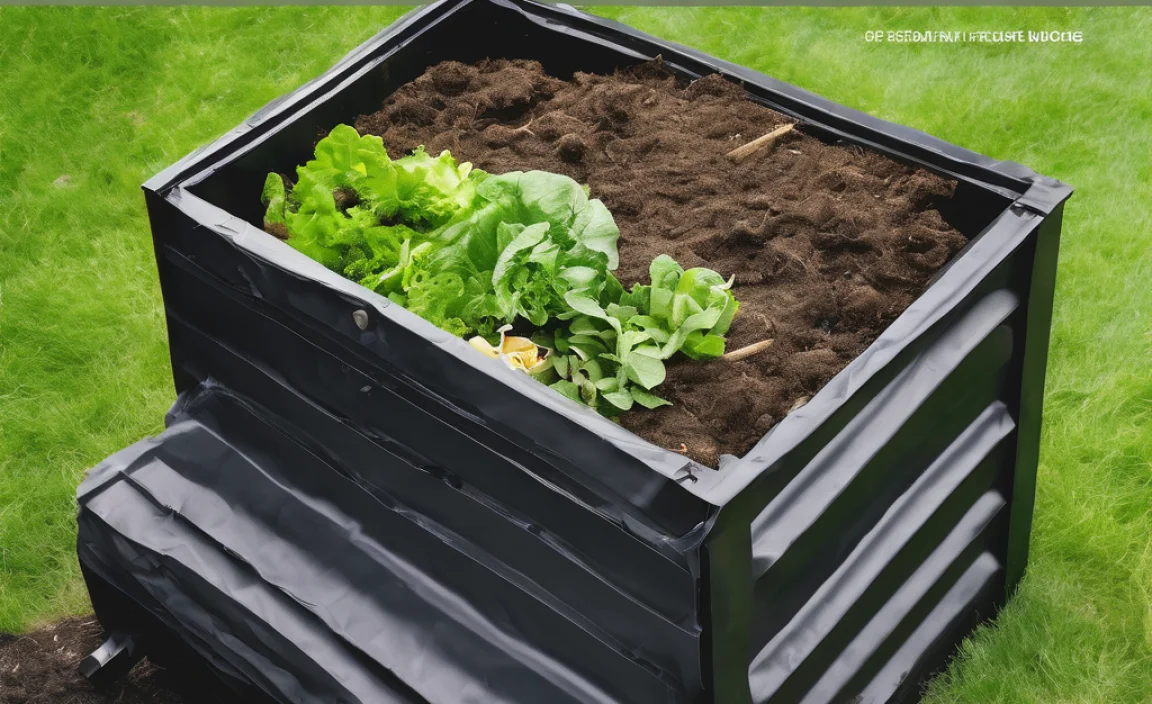Do you know how flowers grow their best? It’s not just water and sunshine. One secret ingredient is compost! Compost helps flowers bloom beautifully. But how do you make compost for flowers? Let’s dive into some compost for flowers tips. You’ll be surprised at how easy it is!
Key Takeaways
- Compost is key to healthy, blooming flowers.
- Use kitchen scraps to make rich compost.
- Avoid adding meat or dairy to your compost pile.
- Compost for flowers tips includes balancing green and brown waste.
- Patience is crucial; composting takes time.
Choosing the Right Ingredients
Composting starts with picking the right ingredients. Not everything can go into a compost pile. Food scraps like vegetable peels are great. Coffee grounds and eggshells work well too. Stay away from adding meat or dairy. They can attract pests and smell bad. Mixing green and brown materials is important. Green items are fresh, like grass. Brown items are dry, like leaves. This mix helps compost break down. Remember to keep adding new material regularly.
- Add fruit and vegetable scraps.
- Avoid adding meat or dairy products.
- Mix green and brown materials.
- Break items into smaller pieces.
- Include shredded paper or cardboard.
- Turn the pile for even composting.
- Keep the pile moist, not soggy.
By choosing the right ingredients, you’re setting a strong foundation. Composting is a natural process. Patience and care are needed. Over time, your pile will turn into rich compost. This compost will feed your flowers. It will make them strong and colorful.
Fun Fact or Stats : A healthy compost pile can heat up to 160°F!
How to Make a Compost Pile
Starting a compost pile is easy. First, pick a spot in your yard. It should be a sunny place. You can use a bin or make a pile on the ground. Begin with a layer of twigs or straw. This helps with drainage. Add your green and brown materials next. Keep the pile damp like a sponge. Turn it every week to add air. This speeds up decomposition. Over time, your pile will shrink as it breaks down.
- Choose a sunny spot for composting.
- Start with a layer of twigs for drainage.
- Add green and brown materials.
- Keep compost damp but not soggy.
- Turn the pile weekly for aeration.
- Watch for signs of decomposition.
- Be patient; composting takes time.
Once your compost is ready, it will look dark and crumbly. It should smell earthy. This compost is ready to use! You can add it to your garden to help flowers grow. This natural process is rewarding. You’re reducing waste and feeding plants.
Fun Fact or Stats : Composting reduces the amount of waste sent to landfills.
Understanding the Composting Process
The composting process is fascinating. It involves tiny creatures like bacteria and worms. These creatures break down your compost pile. They love damp, warm conditions. As they work, the pile heats up. This heat helps break down materials faster. You will notice steam rising from the pile. That is a sign of active composting. Over time, the pile will shrink in size. This is because materials are breaking down into compost.
- Composting involves bacteria and worms.
- Pile heats up during decomposition.
- Keep pile damp for active composting.
- Steam indicates active composting.
- Watch the pile shrink over time.
- Compost becomes dark when ready.
- Use finished compost in the garden.
Understanding this natural process is exciting. You’re creating something valuable from waste. By composting, you’re helping the environment too. Less trash goes to landfills. More nutrients go back to nature. It’s a win-win situation.
Fun Fact or Stats : Composting can reduce household waste by up to 30%.
Benefits of Compost for Flowers
Compost offers many benefits for flowers. It acts as a natural fertilizer. It enriches the soil with nutrients. These nutrients are essential for flower growth. Compost also helps soil retain moisture. Flowers need water to thrive. With compost, they don’t dry out quickly. It also improves soil structure. Good soil means stronger roots. Composting is an eco-friendly way to garden.
- Compost enriches soil with nutrients.
- Helps soil retain moisture.
- Improves soil structure for strong roots.
- Acts as a natural fertilizer.
- Eco-friendly and sustainable.
- Reduces need for chemical fertilizers.
- Supports healthy plant growth.
Your flowers will thank you for using compost. They will grow taller and bloom more. The colors will be vibrant. By using compost, you’re creating a healthier garden. You’re also helping the planet. This small effort makes a big impact.
Fun Fact or Stats : Plants grown with compost are more resistant to disease.
Common Composting Mistakes
Composting is easy, but mistakes can happen. One mistake is not balancing green and brown materials. This leads to a smelly pile. Another mistake is adding meat or dairy. These attract pests like rats. Overwatering the pile can slow decomposition. It becomes soggy and smelly. Underwatering can dry out the pile. It stops composting. Forgetting to turn the pile is another mistake. Turning adds air, which is crucial.
- Balance green and brown materials.
- Avoid adding meat or dairy products.
- Don’t overwater the pile.
- Keep pile moist, not soggy.
- Turn the pile regularly for aeration.
- Watch for pests and correct mistakes.
- Be patient and monitor the process.
Learning from mistakes is part of composting. It’s okay to make them. Each mistake is a lesson. With practice, you become better at composting. Your pile will produce great compost for your flowers. Remember, patience and care are key.
Fun Fact or Stats : Around 62% of waste can be composted.
Using Compost in Your Garden
Once your compost is ready, it’s time to use it. Spread the compost around your flowers. Mix it into the soil gently. This gives flowers a nutrient boost. You can also use compost as mulch. It helps retain moisture. Apply it in a thin layer. Too much can smother plants. Water the area well after adding compost. This helps nutrients soak into the soil.
- Spread compost around flower beds.
- Mix compost gently into the soil.
- Use compost as mulch for moisture.
- Apply in a thin layer to avoid smothering.
- Water flowers well after composting.
- Boosts nutrient levels in the soil.
- Creates a healthy growing environment.
Your garden will look lush and vibrant. Compost provides everything flowers need. With regular composting, your garden thrives year-round. You’re creating a beautiful space that benefits you and nature. It’s a simple yet powerful act.
Fun Fact or Stats : Compost can improve soil in as little as six months.
| Ingredient | Green/Brown | Decomposition Speed | Best Use |
|---|---|---|---|
| Fruit Scraps | Green | Fast | Compost Pile |
| Leaves | Brown | Medium | Compost Pile |
| Eggshells | Neutral | Slow | Compost Pile |
| Grass Clippings | Green | Fast | Compost Pile |
Conclusion
Composting is a great way to help your flowers. With these compost for flowers tips, you can make rich compost. Your flowers will be healthy and vibrant. Remember to choose the right ingredients. Be patient and watch your garden bloom beautifully.
FAQs
Question: Why is compost good for flowers?
Answer: Compost adds nutrients to the soil, helping flowers grow healthy and strong. It improves soil structure and helps retain moisture. This makes it easier for flowers to absorb water and nutrients. Using compost is a natural way to boost flower health.
Question: What should I not put in compost?
Answer: Avoid adding meat, dairy, and fats. These attract pests and smell bad. Also, don’t include glossy paper, diseased plants, or pet waste. These can harm your compost pile. Stick to fruit scraps, vegetables, and yard waste for the best results.
Question: How long does compost take to be ready?
Answer: Composting takes time and patience. Typically, it takes about 3 to 6 months for compost to be ready. Factors like temperature, materials, and how often you turn the pile can affect the time. With care, you’ll have rich compost sooner.
Question: Can I use compost for all types of flowers?
Answer: Yes, compost is good for all types of flowers. It provides essential nutrients that flowers need. Whether you’re growing roses, daisies, or sunflowers, compost is beneficial. It helps them grow stronger and bloom more beautifully.
Question: How often should I add compost to my garden?
Answer: You can add compost to your garden 1-2 times a year. Spring and fall are the best times to do this. Adding compost regularly keeps the soil rich and supports continuous flower growth. It’s an easy way to maintain a healthy garden.
Question: What are some easy compost for flowers tips?
Answer: Start with the right ingredients. Balance green and brown materials. Turn your pile regularly. Keep it moist but not soggy. Be patient as composting takes time. These simple tips will help you create great compost for beautiful flowers.



